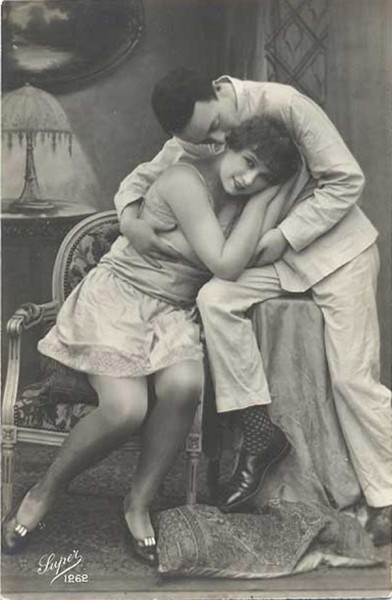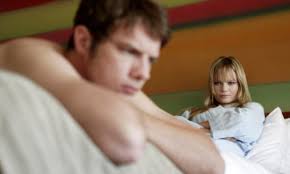Depressed After Sex? It’s More Common Than You Think
Sex is increasingly touted as the great mood cure-all. It’s said to release the hormone oxytocin as well as endorphins, meaning we sleep better, feel calmer, and approach life more positively. So basically, sex is guaranteed to make us feel great every time, right?
Wrong.
The truth is that some forms of sex can actually cause low moods instead of happiness. The myth that all sex makes us feel good can actually be dangerous. It means that those who do feel depressed after sex might be afraid to speak up or seek support. And it can lead to you feeling you ‘should’ have sex and not checking in with your true feelings at the time, which is actually one of the ways sexual encounters can leave you depressed.
10 Types of Sex That Can Cause Low Moods and Stress
1. Sex when deep down you don’t actually feel like it.
Many of us are dishonest with ourselves on the sex front. It could be that you are codependent, so caught up in pleasing your partner you have lost track of what you really want. It could be that you feel you ‘should’ want sex because you are married or love your partner, so ignore your fatigue or moods and say yes when deep down you want to sleep or get work done. Or that you are afraid to voice when you do want to get physical so are stuck going with your partner’s whims over your own.
Or maybe you are just not admitting to yourself that the person you love spending time is just not sexually interesting to you, but are trying to convince yourself you should be more than friends as it works on paper.
If you often find you feel a bit down directly after a sexual encounter, or even in the day following one, ask yourself next time, is this experience what I really want right now? Check in with yourself. Does the idea of having sex make you feel excited and good? Or do you feel tense in your stomach and shoulders, and a feeling of dread? What is the worse thing that could happen if you said, no, not now?
2. Sex that doesn’t satisfy you.
There are two sides to this one – there is sex where it isn’t enough, and there is sex where it is actually too much. Both can lead to feeling low after. Sex that isn’t enough to leave you feeling fulfilled, either due to an issue on your partner’s side, lack of communication, or just a mismatch in sexual preferences, can lead to a buildup of frustration and confusion. And if you are instead being pushed too far by a partner, doing things that deep down you aren’t comfortable with or just don’t find pleasurable, this can lead to resentment and low self-esteem.
It’s important to talk and not let things go on. If it’s too hard to communicate without fighting or hurting each other, do consider a couples therapist or sex therapist, who isn’t there to take sides but simply to help you communicate effectively and find resolution.
3. ‘Fix it’ sex.
 ‘Make up sex’ happens now and then, and has its purpose. But if sex has become something you habitually do with your partner instead of resolving conflict, communicating, and connecting, it’s likely it will eventually leave you feeling down instead of loved and will lead to you feeling depressed after sex. Consistently pushing aside how you feel results in a buildup of negative emotions and thoughts and is just not a viable long-term tactic.
‘Make up sex’ happens now and then, and has its purpose. But if sex has become something you habitually do with your partner instead of resolving conflict, communicating, and connecting, it’s likely it will eventually leave you feeling down instead of loved and will lead to you feeling depressed after sex. Consistently pushing aside how you feel results in a buildup of negative emotions and thoughts and is just not a viable long-term tactic.
4. Sex that physically hurts.
If sex is hurting you and you are ignoring that it’s causing you pain out of fear of what it is, or a belief that it ‘must be in your head’, then unsurprisingly sex can leave you feeling low every time.
If sex hurts it is important to look into it. Pain during sex can be caused by an infection, menopause, fibroids, irritable bowel syndrome (IBS), or, in men, prostatitis. Leaving it will only make things worse.
And even if it is ‘just in your head’, that doesn’t mean it’s not a serious issue and that you don’t deserve attention and help to fix it. If you are suffering an emotional or psychological problem that is leading to you feeling pain, it is just as valid as a physical issue, and a counsellor or sex therapist can help.
5. Sex in an open relationship.
The idea of an ‘open relationship’ can sound exciting. But without very clear communication and boundaries open relationships can lead to confusion, hurt, and sex that leaves you feeling jealous or used. It’s important to know how to make an open relationship work before jumping in, and to not feel you have to say yes to one if your partner asks but it isn’t actually what you want. If you are going to try one, learn how to keep an open relationship healthy.
6. Casual Sex.
A study by researchers at California State University surveyed almost 4,000 heterosexual college students about their moods and sexual habits, and claimed a link between casual sex and higher levels of depression and anxiety in both men and women.
Of course the study looked at people from only one age bracket, and didn’t look at what else was a stressor in their lives, so the results could be argued. At the same time, given how many of us have low levels of self-esteem and confidence, it’s quite logical that casual sex would be more likely to cause a low mood than a high mood. Casual sex doesn’t create an atmosphere of trust or safety but one where we are judged on looks and performance, and if it’s an act of secrecy it can also leave us feeling guilty and ashamed.
A more recent study at Cornell University in America found that in a study group the ones who felt better from casual sex were, rather stereotypically, narcissistic men.
7. Sex when depressed.
While it’s true that sometimes loving sex when depressed can lead to a mood boost, it’s certainly not always the case. If your depression is at all related to self-esteem, confidence, or childhood abuse, sex can leave you feeling worse, triggering old negative belief patterns. And if your depression is related to fear of rejection, and you are sexually engaging with someone you don’t feel secure with, you can definitely be left feeling unstable after.
8. Addictive sex (including pornography).
 Addictions exist because of the high they offer. But as the saying goes, what comes up must come down. And sex addiction is no different. If you are using sex as a distraction from reality or to numb out emotional pain, even though you might get a bigger ‘rush’ from sex than most people you will also, inevitably, hit depression soon after.
Addictions exist because of the high they offer. But as the saying goes, what comes up must come down. And sex addiction is no different. If you are using sex as a distraction from reality or to numb out emotional pain, even though you might get a bigger ‘rush’ from sex than most people you will also, inevitably, hit depression soon after.
Pornography is increasingly a form of addictive sex, and it’s your brain itself that is getting hooked. Dr. Norman Doidge, in his popular book The Brain That Changes Itself, talks about how pornography is highly addictive because looking at it triggers pleasure chemicals in the brain. As modern pornography now tends to be much ‘harder’ than it used to be, it triggers an even stronger chemical reaction that can mean your brain develops an addictive pattern quickly even if you just began looking out of natural curiosity.
9. Internet sex
One step further than porn is interactive sex. A study of people using online sex sites carried out at the University of Technology in Melbourne surveyed 1,325 males in Australia and America who spent on average 12 hours a week using online chats or webcam sites, or internet porn. They found that 27 per cent were moderate to severely depressed, 30 per cent had high levels of anxiety, and 35 per cent were moderately to severely stressed.
While it is true that people seeking sex online are likely to already be seeking a stress relief or feeling low and/or lonely and looking for distraction, the study also found that the more the study group engaged in online sex, the higher their level of stress and anxiety was.
10. Sex if you suffer “Postcoital Dysphoria”
There is a body of research slowly forming around the idea that some people are just biologically wired to have negative emotions after sex, including feeling melancholy, irritable, and anxious. It’s called ‘Postcoital Dysphoria’ (PCD).
Even taking into account the effects of childhood sexual abuse, it seems that in some cases psychology alone cannot explain why some people feel intensely depressed after sex. New York psychiatrist Dr. Richard A. Friedman did an experiment after finding several of his patients had no psychological reason for heavy depression after sex and suspecting it was possibly neurobiological. He gave the patients Prozac, and the depression faded. That’s not to say that medication is the answer, though, as it also left the subjects enjoying sex far less.
If you worry you might be biologically wired to be sad after sex, it’s highly advisable you seek professional help.
Conclusion
Sex is still a territory where there is a lot of research to be done, especially when it comes to how it affects our emotions and our minds. In fact despite research that sex makes us feel good, other research shows that orgasms can cause a desensitisation of the ‘reward circuitry’ of the brain for several days in some cases, until the brain recovers. Dopamine receptors decline as well, which might affect our sense of wellbeing.
The best thing when it comes to sex is to listen to yourself. Don’t let someone else talk you out of how you feel or what you want. And if you are consistently experiencing low moods after sex or worry something is wrong, don’t be afraid to seek help. A good counsellor or therapist who specialises in sexual issues will be able to put you at ease and create a safe, non judgemental environment where you can work through what you are dealing with.
Did you enjoy this article? We’d love it if you shared it. Harley Therapy is committed to making psychological wellbeing something we can all talk about, and we appreciate your help spreading the word.
Images by Guardian Newspaper, Vintage Visions, Celine Nadeau
 Andrea M. Darcy is the commissioning editor and main writer for Harley Therapy counselling blog as well as a college dropout from a degree in counselling. She has worked as a writer for over 12 years, writing for publications like the Daily Mail, Psychologies, and Top Sante. Find her on Instagram @am_darcy
Andrea M. Darcy is the commissioning editor and main writer for Harley Therapy counselling blog as well as a college dropout from a degree in counselling. She has worked as a writer for over 12 years, writing for publications like the Daily Mail, Psychologies, and Top Sante. Find her on Instagram @am_darcy






Number 10 is very likely related to sex-hormones.
A fast drop in hormone levels can leave the body with a feeling of being separated (from the blissful feeling these hormones granted). If not recognized , this can effect anything and everything else you do for the next day or so. Including the way you see the world or life itself. The body can respond poorly to the drop and give way to all sorts of bad feelings , including fear , loneliness , depression and even suicidal thoughts. But it all revolves around what the body needs and not you as a person , so if you can fathom this in that moment , you can strain the bad feelings yourself and avoid dramatic choices you would regret. As the.body automatically resupplies itself with new hormones over time , the bad feelings go away. Remember that by all means , these are psychologic and physical effects that can obscure reality.. .
This psychological effect is similar to the effect of having the testicles or ovaries removed.
Hi Z, thanks for sharing this. Interesting, and could be part of it for those who are biologically wired in such a way. Not our area of expertise, as we deal with the psychological side. But yes, there is some research that proves for some it’s biological, and definitely hormones can be connected to low moods. For example, pre-menopausal women can suffer severe anxiety out of the blue, and with the wrong doctor can end up on anti-depressants without realising it’s related to hormonal shifts.
I am always exited to have sex but my husband sleeps separate due to his ego . He doesn’t discuss the reason with me but replies with bad words. It’s past 10 yrs I did not have Sex and now I My mood always swings to have at the age of 49.why is it so wat shud I do. My husband doesn’t understand 😂
Hi Rajani, that sounds a really hard relationship to be in, void of connection and the intimacy you crave. We don’t know what country you are in, and what your culture supports or doesn’t support when it comes to relationships. But a healthy relationship needs connection. We’d suggest marriage counselling, but as we suspect he would not be open to that, we would suggest you seek counselling for yourself to help you find your self-esteem in this rather demeaning situation and decide if you want to stay in the relationship or not. As for 49 and mood swings, that is very normal! It is a result of approaching menopause and changing hormones.
Thank you for your article Andrea. Helped me a lot.
Glad to hear! Best, Andrea.
Firstly great points, but my main issue is that immediately after sex I don’t want to be touched anymore and if there is cuddling afterwards it’s because I’m laying there. I’m also shying away from labeling it as a relationship. I know I need to break away from the cycle of meeting up having sex then same again a week or so later. I believe my main issue is sex is in my mind because I’m in between our in counters I’m watching porn of some sorts which I seem to have an unhealthy addiction too for as long as I can remember.
Any advice on this matter would be most appreciated.
hi Eugene, we’d say it’s likely more of an intimacy issue or a trauma issue. Sex addiction and sexual encounters we deep down don’t even want or enjoy are symptoms, not the issue itself. Some people use drugs, others alcohol, some use workaholism, and some of us use sex, these are all negative coping mechanisms, avoidance mechanisms. Using self destructive behaviours to avoid uncomfortable and painful thoughts and feelings. So the issue would be found by looking at what happened in your life that upset you and caused you pain, and gave you hidden negative beliefs about what you do and don’t deserve, what your value is and isn’t. And preferably doing so in a safe and supportive environment, such as with a counsellor or therapist you feel you could grow to trust. And to work from there. Best, HT.